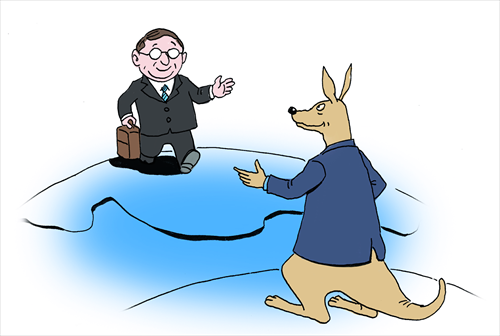HOME >> OP-ED
Australia has nothing to fear from Chinese
By Xu Qinduo Source:Global Times Published: 2015-6-3 23:23:01

Illustration: Liu Rui/GT
In 1910, Ham Hop arrived in Australia to join her husband Poon Gooey, who was a produce merchant in the State of Victoria. Under the Immigration Restriction Act, Hop was allowed to stay for only six months. Her departure was delayed for a few times due to giving birth to two daughters. The Australian government threatened deportation and the family eventually were forced to leave Melbourne for their homeland, China, in 1913.
This case is often cited as an example of discrimination toward Chinese under the infamous "White Australia" policy of the past. But the story today is entirely different.
When I walk on the street in the center of Melbourne, the second largest city in Australia, I often hear people talking in Putonghua. Bank branches in Chinatown have Chinese staff to serve those who don't speak fluent English. When arriving at the Melbourne airport, many Chinese people are struck by a welcome sign which is completely in Chinese.
Since China and Australia forged diplomatic ties in more than 40 years ago, the bilateral relationship has developed in leaps and bounds.
China has been Australia's largest trading partner for years and Canberra has embraced immigrants from China as well as the arrival of hundreds of thousands of young Chinese students.
As of 2011 when the last national census was conducted, Australian residents with Chinese ancestry make up around 4 percent of the total population, or about 865,000. The number of those born in the Chinese mainland had grown by 54 percent compared with five years ago in 2006.
The growing Chinese community in Australia contributes tremendously to the local economy as well as cultural diversity.
According to Australian broadcaster ABC, international education is the third largest earner of export revenue for Australia, generating more than 12 billion Australian dollars a year, trailing only the coal and iron ore extraction.
Among the international students in Australia, 30 percent are from China. Wang Xing, a local resident in Melbourne, has been living in Australia for four decades since he moved to the country from Singapore at the age of 30. He told me that, without Chinese immigrants and young students, the CBD - the heart of Melbourne - wouldn't be filled with the vitality it has today.
Chinese presence in Australia also comes from relatively invisible sector of trade, such as the export of iron ore to China. Despite the slowdown of the Chinese economy from its previous double-digit growth, the Chinese market continues to be huge for Australian products.
Chinese investments in Australia are also impressive. A recent report by Credit Suisse said that China for the first time has become Australia's biggest source of foreign investment, overtaking the US in the last financial year.
It forecasts that Chinese buyers could pump as much as 60 billion Australian dollars into the housing market over the next six years.
But growing ties between China and Australia don't mean the road ahead is free of bumps.
Quite a stir was caused in May by a local Chinese businessman, Chen Guojing, when he uttered that "luxury housing and expensive cars are all bought up by us Chinese. Mineral and energy resources all bought up by us Chinese. If there were no Chinese, Australia couldn't survive."
Chen, who moved to Australia some 27 years ago, is a Melbourne-based commercial and residential property developer.
He was commenting on the contradictory attitude by some Australians: On the one hand, there's some resentment about behavior like Chinese purchasing properties; on the other, Chinese investments creates jobs and wealth.
Chen was condemned by local Chinese for his simplifying a much more nuanced topic. But his views on the contradictory attitude may be vindicated by the leakage in April of what Australian Prime Minister Tony Abbott said of the drivers of his China policy: fear and greed.
Greed means attractive business connections with China. What is fear?
It's understandable that Australia, a country with a population of less than 24 million, the size of Shanghai, has mixed feelings toward the rise of China. But history of China-Australia ties shows that Beijing has always treated Canberra with due respect and maintained this relationship with good will.
Enhanced understanding and trust are necessary between China and Australia, as truth and trust is the best antidote to fear. It's been more than 100 years since Ham Hop experienced hard-hearted discrimination. Let's hope the country won't take much longer to get rid of "fear."
The author is a commentator on current affairs with China Radio International. He is now a visiting scholar at the University of Melbourne. opinion@globaltimes.com.cn
Posted in: Viewpoint